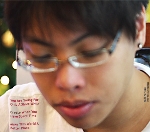A YORKSHIRE TERRIER URINE MARKS
Dr
Sing Kong Yuen, BVMS (Glasgow), MRCVS
11 July, 2011 |
 toapayohvets.com toapayohvets.com
Be Kind To Pets
Veterinary Education
Project 2010-0129 |
Sunday July 11, 2011
A young couple came on this bright sunny Sunday morning
at 9.30 am with a one-year-old male Yorkshire Terrier to
neuter. I was getting ready to neuter a 3-month-old
dwarf hamster that Dr Jason Teo had passed to me to do.
"Why do you want to neuter him?" I asked the young
couple. A Yorkshire Terrier puppy sells for $2,500 and
it seems that it is a pity to neuter him. But most
Singaporean pet owners don't breed.
The couple said: "He does urine-mark and we research the
internet. It says that urine-marking can be stopped if
the dog is neutered."
"Yes," I said. "In most cases, urine-marking will stop
if the male dog is neutered at a young age."
"Has he eaten his breakfast?" I asked.
"Not really. He nibbled a bit of his dog food." No food
and water ought to be given to the dog 12 hours before
anaesthesia but in this case, the dog could or could not
have eaten much. In such cases, I have to use my
judgment as the couple may not be free during weekdays
to bring the dog down for neuter. So, I decided to
operate myself.
ANAESTHESIA & SURGERY
"Do you want IV?" my assistant Mr Min asked me as most
of the time, my associate vets and I give IV.
"No," I said. "IM will do."
I gave the Yorkshire 0.1 ml xylazine IM. No vomiting
seen. After 15 minutes, I gave him isoflurane gas by
mask and then intubate. 2% isoflurane gas provided a
perfect surgical anaesthesia in this case. I ligated
twice/spermatic cord with 2/0 absorbable sutures. No
problem of bleeding.
I complimented my assistant for good work. He is getting
more proficient as he keeps working as he has not much
experience in veterinary anaesthesia in his past work
places. A good veterinary assistant during anaesthesia
is worth his weight in gold as the vet can just focus on
the surgery which is already a big responsibility.
The bleeding was more from the skin after I gave one
horizontal mattress suture to close it.
"No need subcuticular sutures?" Mr Min asked me. My
associate vets do subcuticular. "The less sutures the
better for the dog," I gave this tip to Mr Min who is
qualified as a Myanmar Vet but is working here as a
Veterinary Technician. "From my 40 years of experience,
I find that just one horizontal mattress suture and no
subcuticular sutures method is the best. Less sutures
means less irritation for the neutered dog and less
licking."
Tolfedine 6mg at one tablet twice a day should be
sufficient for this Yorkshire. Trimethoprim syrup post
op. In all dog neuters, one packet of absorbable sutures
will do. There is the fanciful wish to impress the owner
with "hidden sutures" under the skin. In this case,
another packet of finer sutures need to be used. What is
best for the dog is the least number of sutures and
least cost to the owner and the veterinary surgery. Not
fanciful suturing patterns to impress the owner at the
expense of the veterinary practice as some employee vets
are prone to do so.
I gave an e-collar just in case he bites the surgical
area. Also a plaster to cover and protect it. I expect
no post-surgical complications of bleeding or infection.
The young couple looked happy as the Yorkshire was as
normal as can be when they came 3 hours later to pick
him up to go home. As if he has a short nap.
That is the advantage of a very light sedation and
isoflurane gas. Most owners just want to see their pet
greet them as alive as can be when they come to pick him
up. Not drugged, groggy and ataxic dogs sleepy for
several hours after surgery due to intravenous
anaesthesia. |
|
To
make an appointment: e-mail
judy@toapayohvets.com
tel: +65 9668-6469, 6254-3326 |
 toapayohvets.com toapayohvets.com
Be Kind To Pets
Veterinary Education
Project 2010-0129 |
|
|
 Toa
Payoh Vets Toa
Payoh Vets
Clinical Research
|
|
|
Copyright ©
Asiahomes Internet
All rights reserved. Revised: July 11, 2011
Toa Payoh Vets
| |
 TOA
PAYOH VETS
TOA
PAYOH VETS TOA
PAYOH VETS
TOA
PAYOH VETS